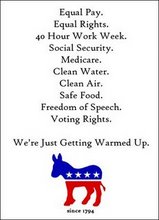Means, motive, opportunity
Scenario: 2006 mid-term election
By Ernest Partridge
Online Journal Guest Writer
(Excerpt)
Clearly, the Democratic Party and its allies look forward to “victory” in 2006 because they are in denial: they simply cannot bring themselves to face the compelling evidence that in the United States today, the electoral process is rigged, thus the will of the people is irrelevant to the governance of the nation, and thus the United States has ceased to be a democracy.
Neither the 2004 Democratic Party presidential candidate, John Kerry, nor the party’s chairman, Howard Dean, will publicly entertain the very notion that “the fix is in.” The issue of electoral fraud is simply not on the agenda of the Democratic National Committee. Prominent progressives such as Vermont’s Bernie Sanders, Al Franken, Paul Begala, and Arianna Huffington insist that Bush won the election, “fair and square,” and that the “anomalies” in Florida and Ohio were not sufficient to have determined the outcome. As for the media, actor and activist Peter Coyote reports that there is a “lock-down” order throughout the mainstream media that the issue of electoral integrity is simply not to be mentioned. Violation of the order can be a career-ender. And, in fact, with the exception of Keith Olbermanm, one is hard-pressed to identify anyone in the corporate media who has mentioned the issue.
[Snip]
The evidence of massive election fraud in 2004 is compelling, and continues to accumulate, despite the media “lockdown.” Just last week, a group of university statisticians released a report which calculates at a million to one the probability that the discrepancy between the exit polls (indicating a Kerry victory) and the final results was due to random error. Because I have discussed at length the evidence for fraud in the 2004 election, I will not repeat it here. But for those who wish to have yet another look at the evidence, see The Crisis Papers page, モWas Election 2004 a Fraud?ヤ. Suffice to say that as the evidence accumulates, the media remain mute and the public remains unconcerned.
Clear, contrary evidence that the election returns were accurate and the outcome legitimate is simply nonexistent. This is so, because the election procedure was designed not to provide validation. The software source codes were secret, there was no paper record, and there was no parallel validation procedure for the centralized compilation of voting totals. To the repeated plea for validation, all that the voting machine technicians could say is “trust us”—“us” being partisan Republicans who built, coded, and operated the “black box” voting machines.
Aside from the now-familiar GOP retorts of “get over it!” and “don’t be paranoid,” the crux of the case of electoral legitimacy is “they wouldn’t dare rig the election,” or alternatively, “the Republicans have too much respect for our democracy to do such a thing.”
With much less provocation than this, the citizens of Ukraine and the Republic of Georgia demanded, and got, new elections, which reversed the outcomes of the corrupted elections.
As most “CSI” and “Law and Order” viewers are well aware, in their search for suspects, detectives look first of all for “means, motive and opportunity.”
The “means” for election fraud are so obvious and indisputable that even the Republicans will not dispute them. The “means,” of course, are the machines and secret software of the Diebold and ES&S corporations that recorded more than 30 percent of the votes cast, and 80 percent of the votes centrally compiled, in the 2004 presidential election.
The lack of an independent paper record or any other mode of verification, the minuscule chance of discovery, and the accommodating silence of the media provides the “opportunity.”
There remains the question of motive.
Remember, first of all, that 2004 was not an ordinary presidential election contest whereby the incumbent, should he lose, graciously concedes to the winner and then retires to play golf, give speeches at one-hundred grand a pop, or even do sufficient good deeds to eventually win a Nobel Peace Prize.
In this election, the stakes were much higher. The Republicans gathered and invested a half billion dollars in order to win, and they did so for good reason. In Bush’s first term, billions of dollars were transferred from the poor, the middle class, the federal treasury, and future generations, to the super-wealthy, with many billions more to come in a second Bush term. Many of Bush’s friends and benefactors, possibly including his vice president, have engaged in massive graft and bribery—for example, hundreds of millions of dollars of Iraq reconstruction funds “lost” by Halliburton, and billions of dollars of California utility bills swindled by Enron. Still more crimes: Condi Rice’s perjury before the 9/11 commission, the “outing”of CIA agent Valerie Plame, Tom DeLay’s attempted bribery of Congressman Nick Smith, and the worst crime of all, the theft of the national elections of 2000, 2002, and now 2004. God only knows what else a Democratic attorney general and Democratic congressional investigations might uncover.
The Bush syndicate did not simply wish to stay in office. They had an even greater motive to stay out of the federal slammer.
So it comes down to this: In the 2004 election, the Bush team and the Republican Party had a treasure trove of means and opportunity dropped in their laps. They could, if they chose, “key in” any election result they wanted; for example, they could “swing” a Senate race by nine points or a governor’s race by 15 points (as it appears they did in Georgia in 2002). And, if the 2004 early exit polls were in fact accurate, in the presidential race it now appears that they could drop the Democrat’s percentage by five points, and boost the Republican’s total by the same amount. Thanks to the secret codes and “back-door access” to the voting machines, and thanks in addition to the cooperation of the corporate media, they could do all this without fear of detection.
Mindful of the record of this administration during the past four years, the enormous personal and financial consequences, as above noted, of an election defeat, and the likelihood of that defeat as indicated by the polls, can we really expect them to have said, in effect, “yes, we could steal this election without consequence, but it wouldn’t be right, so we choose to be honest”?
If you believe this, then I have a stack of Enron stock that I’d like to sell you.
Clearly, the Bush syndicate had abundant means, motive and opportunity to commit a crime against the state, in a word treason, and there is compelling evidence that they have done just that. Neither the enforced silence of the media nor the cowardly inaction of the Democrats mitigate this evidence by one iota.
The overarching question, then, is “when will the public wake up to this silent coup d’etat?”
For the issue before us is no longer the protection of American democracy. It’s too late for that. The issue instead is the restoration of American democracy.
And at the moment, that issue is very much in doubt.
Copyright © 2005 Ernest Partridge
Dr. Ernest Partridge is a consultant, writer and lecturer in the field of Environmental Ethics and Public Policy. He publishes the website, The Online Gadfly and co-edits the progressive website, The Crisis Papers. Send comments to: crisispapers@hotmail.com.
Sunday, April 17, 2005
Subscribe to:
Post Comments (Atom)





No comments:
Post a Comment